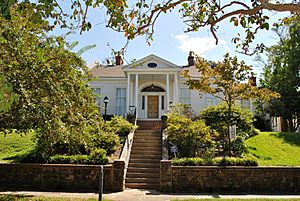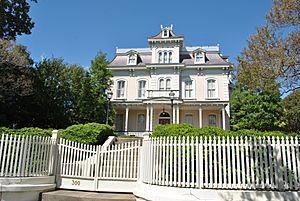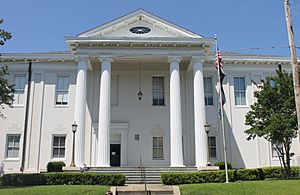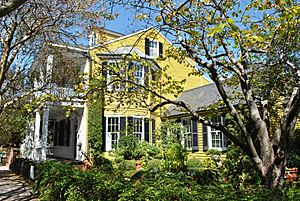Natchez On-Top-of-the-Hill Historic District facts for kids
Quick facts for kids |
|
|
Natchez On-Top-of-the-Hill Historic District
|
|
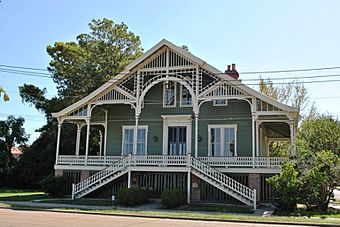
Swiss Chalet style "Edelweiss", at 209 S. Broadway
|
|
| Lua error in Module:Location_map at line 420: attempt to index field 'wikibase' (a nil value). | |
| Location | Natchez, Mississippi |
|---|---|
| Architect | Multiple |
| Architectural style | Greek Revival, Late Victorian |
| NRHP reference No. | 79003381 |
| Added to NRHP | September 17, 1979 |
The Natchez On-Top-of-the-Hill Historic District is a special area in Natchez, Mississippi. It's called a historic district because it has many old buildings and places that are important to history. This district was added to the National Register of Historic Places in 1979. Being on this list means the area is recognized for its historical value and is protected.
Contents
Discovering Natchez's Historic Treasures
This historic district is home to many amazing places that tell stories from the past. You can find sites where important events happened long ago.
Key Historical Locations
- The spot where the first book in Mississippi was printed in 1799. This happened at Andrew Marschalk's printing office.
- The location of Mississippi's very first bank.
- The place where the American flag was first raised in 1798 by Andrew Ellicott. This was near the House on Ellicott's Hill.
- The traditional site of the earliest Sunday school south of Philadelphia, held at a Methodist church.
Amazing Architecture and Buildings
The district is famous for its beautiful buildings. Many of them are built in the Greek Revival style, which looks like ancient Greek temples. You can also see buildings in the Late Victorian style.
Some buildings are truly unique. The district has the best example of Swiss Chalet Style architecture in Mississippi. It also features the finest residential French Second Empire style buildings in the state.
Famous Landmarks You Can Visit
Several buildings in this district are so important that they are called National Historic Landmarks. Others are individually listed on the National Register.
- House on Ellicott's Hill: A very old and important house.
- Stanton Hall: A grand mansion known for its impressive size.
- Rosalie: Another beautiful historic home.
Other Notable Historic Homes
- King's Tavern: One of the oldest buildings in Natchez.
- Winchester House: Built in 1835.
- Williamsburg: Also known as the John Bayton House.
- Prentiss Club: Built in 1904, this yellow brick building has a Second Renaissance Revival style.
- Stratton Chapel of the First Presbyterian Church: A chapel with historical significance.
- First Presbyterian Church: An important church in the community.
- Magnolia Hall: Also known as the Henderson-Britton House.
- The Elms: Built around 1805.
- Green Leaves: A Greek Revival home built in 1838 with Doric columns.
- Presbyterian Manse: Built around 1830.
- William Johnson House: A Greek Revival home from 1841.
- Choctaw: Built around 1835, also known as the Neibert-Fisk House.
- Longwood: A unique, unfinished mansion.
- Melrose: A well-preserved plantation home.
- Glen Auburn: Built around 1875, this house is considered one of the most outstanding homes built after the Civil War. It's also the best example of the Second Empire style in Mississippi.
- Adams County Courthouse: This important building was first built around 1820 in the Federal-style. It was later updated around 1920 to the Colonial Revival style.
- Commercial Bank and Banker's House: Built around 1837, this site includes a bank building and a connected Greek Revival style house.
- The Barnes House: Built around 1836.
The historic district covers a specific area. A map from 1979 shows its boundaries, including the area defined by Monroe, Pine, Orleans, and Broadway streets, plus a bit more.
Images for kids
 | Jewel Prestage |
 | Ella Baker |
 | Fannie Lou Hamer |


